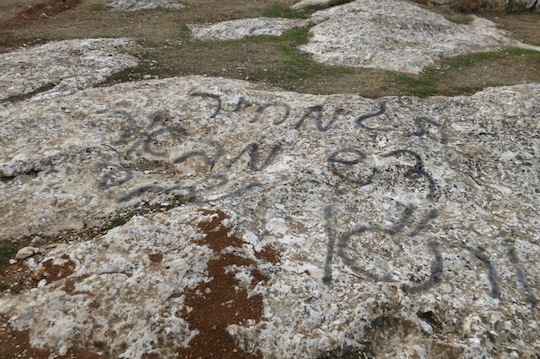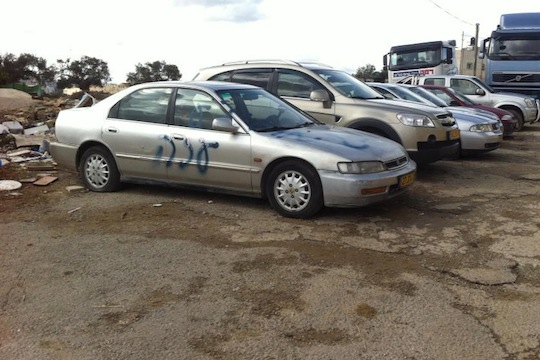While Israelis are breathing a sigh of relief that quiet has mostly been restored (for the time being), and life can supposedly just go back to normal, with Gaza out of sight and out of mind, the other elephant in the room – the West Bank and East Jerusalem – is all but quiet.
This morning (Sunday) a “price tag” attack was identified on a car in Shuafat, a Palestinian refugee camp in East Jerusalem, which is located inside the city’s municipal borders (and thus under total Israeli jurisdiction). The car has the word “Gaza” graffitied on it, as pictured here in a photo taken by the nonprofit Ir Amim:
According to The Times of Israel, a total of eight vehicles in East Jerusalem were vandalized with such messages on Sunday – the second time such an incident took place in the last three weeks.
In addition, last Thursday, one day after the ceasefire between Hamas and Israel was announced, 400 olive and fruit trees were destroyed by settlers in the South Hebron Hills, in yet another price tag attack, which have become all too routine over the past few years and especially months.
Israeli Ta’ayush activists found this message graffitied by the perpetrators:

According to Ta’ayush, a police report has been filed, but as has been reported on here countless times, this rarely leads to arrest and the settlers continue to act with impunity.
In addition last Thursday, while the news was squarely focused on the ceasefire, the IDF quietly conducted a wave of arrests in the West Bank, claiming it was reining in Palestinians who caused unrest throughout the West Bank during “Operation Pillar of Defense.” It is unclear who exactly was arrested or what their offenses are.
During Israel’s military offensive in Gaza last week, +972’s Mya Guarnieri reported that two Palestinians were shot and killed by the IDF while protesting in Nabi Saleh and Hebron. Killed. While protesting.
Also, settlers (thought to be from Yitzhar) reportedly threw stones at a school in Nablus on Saturday, causing damage, which then led to clashes between Palestinians and settlers and the IDF.
Tensions in the West Bank have been especially high due to the violence between Israel and Hamas. The IDF has shown time and time again it is very apt at arresting Palestinians who it claims are endangering the surroundings. But what about the Israeli citizens posing a danger in the West Bank?
As eyes and media are focused on Gaza and Hamas, nothing of course has changed on the ground in the West Bank – a situation just as unsustainable and unjust as Gaza – only much much closer to home.
When someone from abroad asks me, “So, is everything back to normal?” all I can answer is, “no, nothing is normal.”



